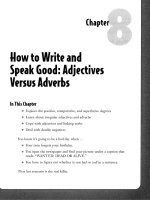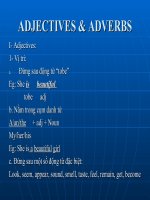Adjectives adverbs
Bạn đang xem bản rút gọn của tài liệu. Xem và tải ngay bản đầy đủ của tài liệu tại đây (101.9 KB, 5 trang )
Thuongmai University, Vietnam
Grammar Rules & Exercises
Adjectives and Adverbs
I. ADJECTIVES: tells us more about a noun. It describes, identify and quantify people
or things and usually go in front of a noun. They don’t change if the noun is plural.
For example:
-
He bought an expensive car last week. - We describe a thing.
Her friend Zoe is a clever girl. - We describe a person.
They live in an old house. - How is the house? Asking for a thing.
II. ADVERBS: tells us more about a verb, an adjective or an adverb. Adverbs modify
verbs, adjectives and other adverbs and usually come after the verb.
For example:
- He talked nervously. - We describe an action.
- It was extremely cold. - We describe a situation.
- They always walk quickly. - How do they walk? Asking for an action.
How to form the adverb
Adjective + ly
- They looked at their broken vase sadly.
- He went quietly into the bedroom.
- She opened the letter nervously.
Adjectives ending in y »»» ily
-
They shouted at the naughty kids angrily.
The children played in the garden happily.
We drank our glasses of orange juice thirstily.
Adjectives ending in -le »»» ly
-
The children did their maths homework terribly.
He was capably supported by his friends.
She stroke her dog's head gently.
Adjectives ending in -ly
friendly - in a friendly way / manner
lively - in a lively way / manner
lonely - in a lonely way / manner
lovely - in a lovely way / manner
silly - in a silly way / manner
daily - daily
early - early
monthly - monthly
weekly - weekly
yearly – yearly
NOTE: There is NO adverb form of adjectives ending in -ly such as friendly/friendlily,
lovely/lovelily....
For example:
-
Yes: She smiled in a friendly way.
No: She smiled friendly.
Some words like: weekly, monthly, yearly, early, and leisurely are both adjective and
adverb.
For example:
- It's a daily paper. / It's come out daily.
- There is an early train./ I got up early.
Irregular forms
fast (adjective) – fast (adverb)
hard (adjective) – hard (adverb)
good (adjective) – well (adverb)
For example, Your English is good. You speak English well.
Double forms
hard - hard / hardly = barely
near - near / nearly = almost
late - late / lately = recently
How to use the adverb
1. Verb + adverb - the adverb describes a verb.
- He drove carefully on the highway.
- They could sell her house quickly.
- Our neighbours's dog always barks at us loudly.
2. Adjective + adverb - the adverb describes an adjective.
-He bought her a necklace which was horribly expensive.
- She was terribly sorry for being late again.
3. Adverb + adverb - the adverb describes an adverb.
- They played terribly badly last weekend.
- He usually does his homework absolutely correctly.
No adverb with the following verbs:
Forms of to be (am, is, are, was, were, will be,...), seem, get, turn, grow, sound, feel,
taste, become, smell, remain, stay, look (in the meaning of look like)
EXERCISES:
Exercise 1: Complete each sentence with an adverb. The first letters of the adverb
are given.
1. We didn’t go out because it was raining heavily.
2. Our team lost the game because we played very ba… .
3. I had little difficultly finding a place to live. I found a flat quite ea… .
4. We had to wait for a long time but we didn’t complain. We waited pat….
5. Mike keeps fit by playing tennis reg… .
6. I don’t speak French very well, but I can understand per… if people speak sl… and
cl… .
Keys:
2. badly
3. easily
4. patiently
5. regularly
6. perfecty …. slowly …. Clearly
Exercise 2: Put in the correct word.
1. Two people were seriously injured in the accident. (serious/seriously)
2. The driver of the car had serious injuries. (serious/seriously)
3. I think you behaved very …. .(selfish/selfishly)
4. Rose is …. upset about losing her job. (terrible/terribly)
5. There was a …. change in the weather. (sudden/suddenly)
6. Everybody at the party was …. dreesed. (colourful/colourfully)
7. Linda likes wearing …. clothes. (colourful/colourfully)
8. Liz fell and hurt herself quite …. . (bad/badly)
9. Joe says he didn’t do well at school because he was …. taught. (bad/badly)
10. Don’t go up that ladder. It doesn’t look …. . (safe/safely)
Keys:
3. selfishly
4. terribly
5. sudden
6. colourfully
7. colourful
8. badly
9. badly
10. safe
Exercise 3: Rewrite the complete sentence using the adverb of frequency in
brackets in its correct position.
1. They go to the movies. (often)
2. She listens to classical music. (rarely)
3. He reads the newspaper. (sometimes)
4. Sara smiles. (never)
5. She complains about her husband. (always)
6. I drink coffee. (sometimes)
7. Frank is ill. (often)
8. He feels terrible (usually)
Keys:
1. They often go to the movies. (often)
2. She rarely listens to classical music. (rarely)
3. He sometimes reads the newspaper. (sometimes)
4. Sara neversmiles. (never)
5. She always complains about her husband. (always)
6. I drink sometimes coffee. (sometimes)
7. Frank often is ill. (often)
8. He usually feels terrible (usually)









